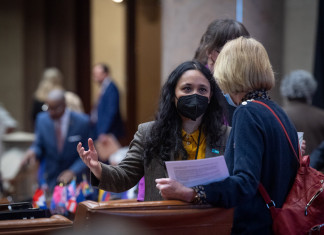The Dutchess County Legislature has approved a new 10-year sales tax distribution agreement with a guaranteed minimum for its municipalities and will also seek to reinstate a mortgage recording tax on homebuyers as a new revenue source.
The resolutions both passed June 10, though local county legislators were divided on the issues.
The sales tax agreement is only between the county and its two cities, Poughkeepsie and Beacon, because the cities had to forfeit their right to levy their own sales tax in order get a deal that covers all municipalities in the county.
Under the agreement, the county will continue to receive a 3.75 percent county sales and use tax, while Poughkeepsie and Beacon surrendered their right to receive a .5 percent similar tax. In addition, the $25 million cap on sales tax imposed by the county for 2013 will continue, but would act as a guaranteed minimum for municipalities. In 2011, the county collected about $150 million in sales taxes, of which about $30 million went to municipalities.
“Regardless of any declines in sales tax…In no event shall municipalities receive less than their proportionate share of the $25 million. The County shall absorb any loss below the $25 million cap,” a county news release on the new agreement said.
A key new provision, however, further softened the deal for towns and villages, guaranteeing that all will share if sales tax revenues increase, When there is an increase in revenue over the previous year, the municipalities will get 85 percent and the cities will get 15 percent.
“The reason I voted for it and why I believe it was crucial, is that if we hadn’t voted for the contract, we wouldn’t have been able to distribute the excess [sales tax revenue], the towns and villages would only have received the $25 million,” GOP county legislator Ben Traudt, who represents Red Hook, told The Observer.
However, Democrat Joel Tyner, county legislator for Rhinebeck, opposed the agreement and voted against it. “Unfortunately, this [measure] basically codifies the $4.5 million cut to the cities, towns, and villages all across the county this year. It’s a big hit,” he told The Observer.
Tyner noted that Rhinebeck was one of the first municipalities in the county to pass a resolution in 2012 protesting the cut in sales tax revenue. “I couldn’t see voting yes to [the resolution],” he said.
Democrat Debra Blalock, who represents Milan in the county legislature, supported the measure. “Even though there was discontent about the process, in the end most agreed to the contract, so the majority of the legislators, including myself, voted for it,” she told The Observer. The discontent she referred to was sentiment that she and Tyner heard from constituents that town and village officials should be given more say in the process.
The prior agreement, which expired in 2005, allowed the county to take 81.55 percent of the total gross tax revenue while the cities , towns and villages got 18.45 percent. The two cities received about 55 percent of that in a fixed amount annually, while towns and villages shared the remaining 45 percent based on population and assessed valuation respectively.
This method of sales tax revenue sharing continued until 2012, when County Executive Marc Molinaro proposed the $25 million cap on sharing in order to close a county budget gap of about $40 million.
The cap was controversial and cost local municipalities monies that they had counted on in the past as a regular income stream in their budgets. For example, the town of Red Hook lost about $41,289 in sales tax revenue because of the cap; the town of Rhinebeck lost $22,830, and Milan lost $12,314.
In the county news release, Molinaro defended the plan by saying, “We believe that by capping the sales tax and changing the growth distribution formula going forward, we have established an agreement which provides the most beneficial arrangement for our towns and villages, without further negatively impacting the two cities, which have borne the greatest impact in the change.”
The county legislators also approved a resolution that is essentially a home-rule request to the state for the right to levy a county mortgage recording tax starting in 2014.
Traudt described the plan as “a one-time tax of .5 percent to be applied at closing. First-time homeowners would be exempt.” He noted that the county had a mortgage recording tax up until 2009, when it was allowed to lapse.
Molinaro included the proposal to reinstate the mortgage tax in the county’s 2013 budget, explaining that it would bring in $4.8 million, which would help make up for the shortfall in sales tax revenue distributed by the county.
Traudt said that he and other legislators who voted to approve the home-rule request in June had actually voted on approving it when they passed the county budget in January.
Tyner, however, disagreed with the proposed tax and said he would prefer to see the county pursue innovative projects to save money, such as using solar panels on county buildings, rather than raise revenue in this way.
“I think one of [the legislature’s] prime responsibilities is to stimulate the economy and create jobs, and this is not the way to do it,” Tyner told The Observer.
Blalock told The Observer that after discussion with the towns in her district, she also voted against the home-rule request. She said her constituents let her know that “everyone is feeling overburdened at this time and even a small increase in taxes is too much.”







Facebook Comments